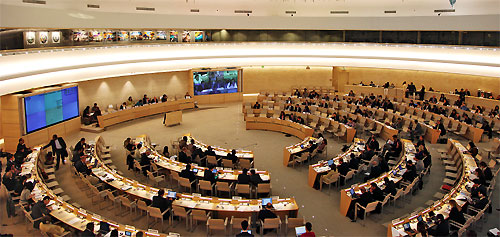|
Lankan experts ask for more healing time
By AMEEN IZZADEEN IN GENEVA Mar 16, 2011 | |
 Three Sri Lankan reconciliation experts have urged the international community to give the country space to move towards reconciliation and national unity that would herald prosperity within a democratic frame. The appeal was made at a panel discussion at the United Nations Geneva headquarters on Wednesday on the sidelines of the ongoing sessions of the United Nations Human Rights Council. The panel discussion was organized by the Council of Liberal Democracy in Sri Lanka (CLD) which recently released the draft of a working document titled National Policy on Reconciliation. Addressing the gathering which included officials from the United Nations, The European Union, Britain and Tamil Disapora members, Presidential Reconciliation Advisor Rajiva Wijesinha said Sri Lanka’s reconciliation process was multi-pronged and meaningful. He said one aspect of the process was restoration which meant rehabilitating the people of the war-ravaged area by helping them to be economically independent through skill development programmes and micro-credit facilities. Prof. Wijesinha said another aspect of the reconciliation process should be political empowerment of the Tamil people by making them participants of the decision making process. He said such empowerment could come through the process of devolution or through the provincial council or local council system. Stressing the need for national unity, he said “majoritarianism does not exist” in Sri Lanka. Consortium of Humanitarian Agencies President Jeewan Thiyagarajah in his address said Sri Lankans were capable of achieving national reconciliation as the topic had been a priority in Sri Lanka for a long time. “We are not brain dead. We are capable of looking into all aspects of reconciliation,” he said. On the question of accountability, Mr. Thiyagarajah said deaths occurred in the war had to be looked into but the priority should be a systematic healing process where truth and accountability would be addressed. Javed Yusuf, former member of the Human Rights Commission and former ambassador to Saudi Arabia, said reconciliation was a frame of mind. It must have a positive outlook. Reconciliation should not be done in a confrontational mood or imposed from outside. He said everyone had a role to play in the reconciliation process but it must be led by the government with civil society playing a contributory role. During the question time, Fr. Emmanuel, President of the Global Tamil Forum said Sri Lanka was making enemies instead of making use of people like him in the reconciliation process. He said he had been living in exile for 14 years and he believed civil society must have freedom to function if reconciliation efforts were to succeed. He said the reconciliation process must address accountability issues, a move which he described as “a confession of guilt” in public. In response, Prof. Wijesinha rejected the call for confession saying even the confession of the Catholic church is a private matter.” However, he said reconciliation was a priority with or without accountability. “It does not mean one should ignore justice,” he said. Krishan Kamalan, a lawyer from Britain, commenting on the Sri Lankan Army’s inquiry into alleged violations of human rights during the last stages of the war, raised questions about its credibility. Mr. Yusuf said the military courts were not the last word in Sri Lanka’s judicial system. If one did not find justice in military courts, there were other judicial avenues within the Sri Lankan system for redress. He said the civil society draft on National Policy on Reconciliation suggests that Sri Lanka should be a caring state. There were questions on the government’s commitment to implement the recommendations of the Lessons Learnt and Reconciliation Commission. The three panelists said the government was committed to implement them and the fact that the LLRC report was submitted to parliament was proof that the government was serious about it. The panel discussion which went beyond the allotted time also saw Prof. Wijesinha questioning the so-called human rights community’s silence with regard to numerous war crimes committed by United States soldiers in Afghanistan. He specifically referred to the recent incident where a US soldier killed 16 Afghan civilians, nine of them children and the abhorrent act of US troops cutting off the fingers of dead militants to keep them as war trophies. The panelists urged the human rights community not to prejudge Sri Lanka but to visit Sri Lanka’s north and east and see for themselves the development work the government had undertaken in these areas for the betterment of the Tamil people. Source: Daily Mirror - Sri Lanka
|
|